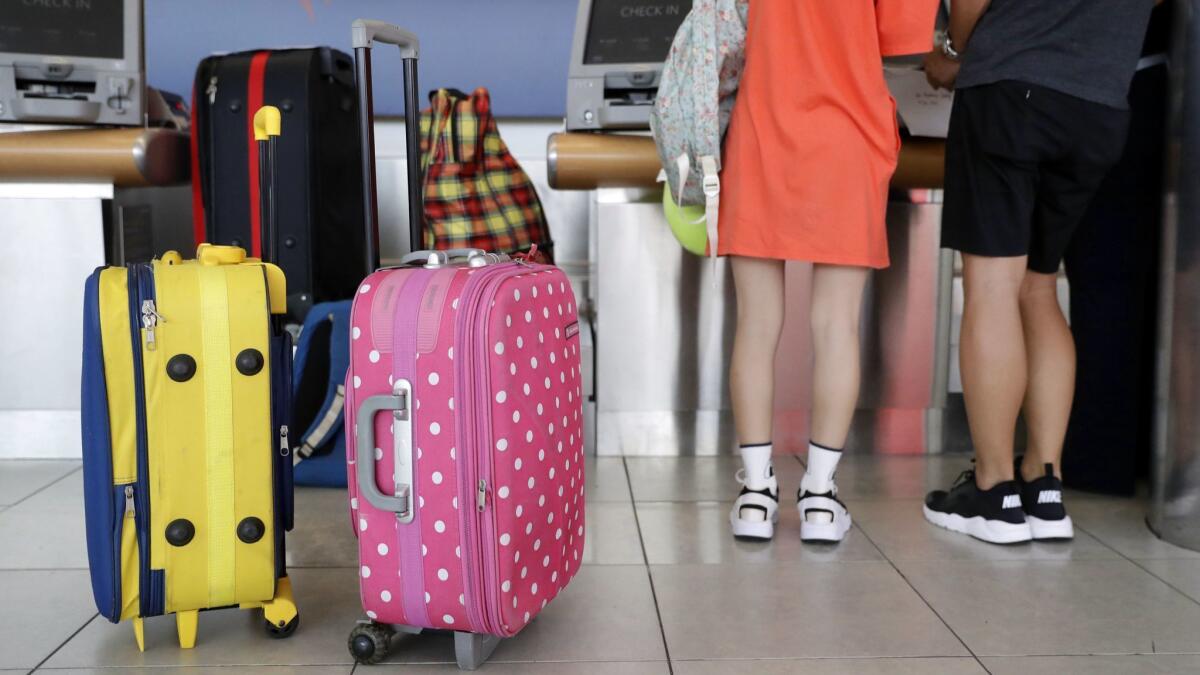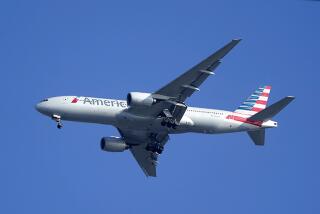FAA funding bill could cut âunreasonableâ airline fees

Congress faces a Sept. 30 deadline to approve funding to keep the Federal Aviation Administration afloat. Right now the bill includes language to curtail âunreasonableâ airline fees. The airlines, with $4.6 billion on the line, are lobbying hard against it.
The FAA reauthorization bill, as currently stipulated, would strip airlines of the ability to levy all sorts of fees and entrust that oversight to the secretary of Transportation.
âThe only thing the airline industry is more committed to than increasing fees for passengers is defeating the provision in the FAA reauthorization bill,â said Sen. Edward J. Markey (D-Mass.).
So, who will win? The airline industry, which has contributed millions to the political campaigns of those who will make the decision? Or consumers, virtually all of whom â Democrat and Republican â hate the fees that airlines add to their ticket prices and will cast votes for their political representatives Nov. 6?
Members of Congress, who fly more than the average American, also bridle at the myriad airline fees that amounted to almost $2.4 billion in the first half of this year and totaled $4.6 billion last year. Some of them fume in public too. But they all are mindful that the airline industry has contributed $12.4 million to the campaigns of incumbents in the last 10 years, according to the Center for Responsive Politics, and already has given incumbents $2.4 million in the election cycle that will end with the Nov. 6 election.
With 470 seats in the House and Senate at stake, there is an element of bite-the-hand-that-feeds-you to the legislation, which must pass by the end of the month. Unless itâs approved, the FAA wonât be funded and â though theoretically implausible â planes wonât be allowed to fly.
People who have flown on something other than Southwest Airlines (which Consumer Reports calls âthe top-rated carrier for price transparencyâ) probably are familiar with the largely opaque and confusing ways in which an apparently cheap ticket can mushroom into something a whole lot more pricey.
â If you buy a âbasic economyâ ticket on some airlines, including United and American, you donât have access to the overhead bins â which means no carry-on luggage. A basic economy passenger on United who brings a large carry-on, in addition to a small personal item, is charged an extra $50 â the standard $25 fee, plus an additional $25 for checking a bag at the gate. Or they can spend more and buy an âeconomyâ ticket.
â The cost of changing a flight varies widely among airlines â as do deadlines for making such changes â with some fees below $100 and others pegged at a flat $200 change fee, unless itâs an international flight. For flights to foreign destinations, change fees escalate.
â Most airlines charge extra for something more than the most basic seat. Itâs not just economy, business class and first class anymore. If you donât want the middle of the row or if you desire two seats together, that can cost you more. Leg room and seats that recline also come at a price.
â The cost of Wi-Fi and the strength of the signal vary in both the fee charged and the power. Want a stronger signal? It costs more.
So, will members of Congress come down on the side of travelers?
Brent Bowen, a dean at the Embry-Riddle Aeronautical University in Arizona, thinks thereâs a âfairly good probabilityâ they will.
âSome of Americaâs more frequent fliers are members of Congress,â Bowen said. âThey get tired of all this. The last time I checked, the top five calls to members of Congressâ offices were complaints about an airline.â
Bowen, who for 28 years has put out the Airline Quality Rating study, said: âThe biggest complaint of the flying public right now is always about fees.â
Forty years after U.S. airlines were deregulated, Section 3129, known as the âfair feesâ provision, âopens the door for the government to re-regulate how much airlines should charge for these secondary products,â said Sean Kennedy, a vice president at Airlines for America, a lobbying group for several key players in the industry.
âTheyâre offering more rock-bottom fares with fewer perks for those families that simply say, âI want to get from point A to point B in the cheapest, safest way possible,ââ Kennedy said. âThe industry now sells things that were free, or included in a base price in the regulated era, but now that weâre deregulated, itâs a la carte.â
Issues like cramped seats, the distance between rows or banning carry-on bags?
âPeople wouldnât buy that ticket if they didnât want that,â Kennedy said. âAn airline that offers a product that people arenât going to use will go out of business very quickly.â
Kennedy said the top goal for airlines is FAA reauthorization, but beyond that their highest priority is getting Section 3129 removed.
Airlines began imposing fees in earnest in 2007; the federal Bureau of Transportation Statistics says 22 airlines collected $464 million for various specified items that year. If the balance of the current year mirrors its first two quarters, the airlines will collect fees of more than $4.7 billion by yearâs end.
A bipartisan quartet â two senators and two members of the House â wrote to the Senate and House transportation leadership last week, underscoring that the flying public doesnât want Section 3129 removed from the bill once it gets to the floor for final passage.
âMajor U.S. air carriers now charge domestic air travelers baggage fees from $30 for the first checked bag to $150 for the third checked bag, yet there appears to be no appreciable cost increase for processing the additional bags,â wrote Sens. Markey and Roger Wicker (R-Miss.) and Reps. Steve Cohen (D-Tenn.) and Walter B. Jones (R-N.C.).
The provision they support would leave it to the Transportation Department chief to decide whether fees are âunreasonable or disproportional to the costs incurredâ by the airline.
More to Read
Inside the business of entertainment
The Wide Shot brings you news, analysis and insights on everything from streaming wars to production â and what it all means for the future.
You may occasionally receive promotional content from the Los Angeles Times.










